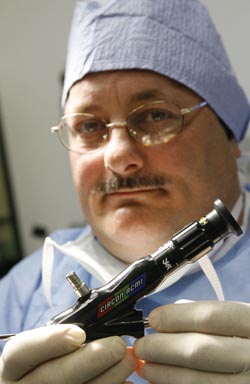Researchers investigate new ways to repair injured bladder
| New preclinical research from the School of Medicine offers proof of concept that a nerve normally used elsewhere in the body could be used to re-innervate bladders injured by lap belts in car accidents.
Michael Ruggieri, research associate professor of urology, published his findings in the spring issue of Neurotrauma. This type of bladder injury, known as lower motor neuron lesion bladder dysfunction, occurs when the part of the seat belt that crosses the lap severely damages the spinal cord nerves that govern bladder function. Consequently, the bladder is unable to contract and signal that the bladder is full. Individuals with this type of injury usually need to undergo intermittent catheterization to be able to urinate. Ruggieri and his fellow researchers are now trying to address not just bladder contraction but also incontinence and are looking at the nerves affecting the urethra. Other members of the research team include Michael R. Ruggieri Sr., Alan S. Braverman, Linda D’Andrea, Randall Betz and Mary F. Barbe of the departments of Urology, Pharmacology, Computer and Electrical Engineering, and Anatomy and Cell Biology at Temple University and Shriners Hospital of Philadelphia. |
 Photo by Ryan S. Brandenberg/Temple University
Michael Ruggieri, research associate professor of urology, and his fellow researchers are now trying to address not just bladder contraction but also incontinence and are looking at the nerves affecting the urethra.
|
|
This work was supported by a research grant from the Shriners Hospitals for Children. |
|